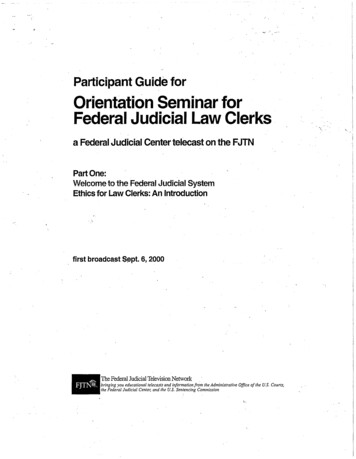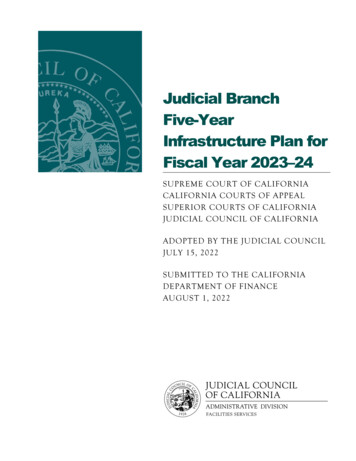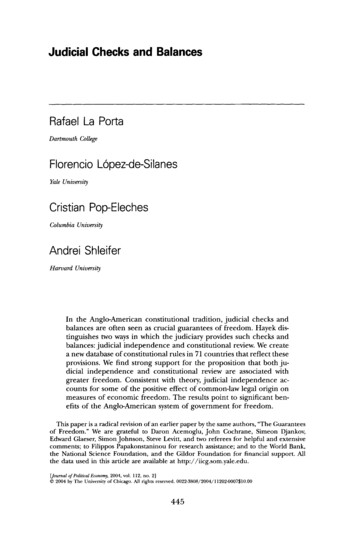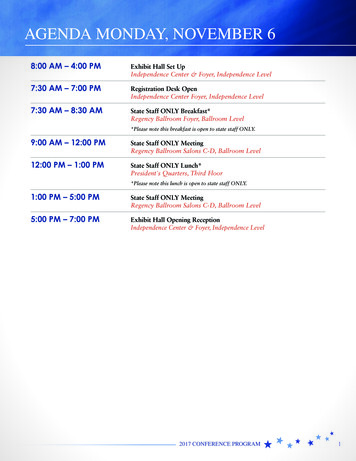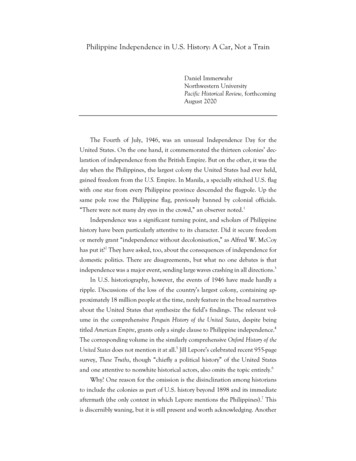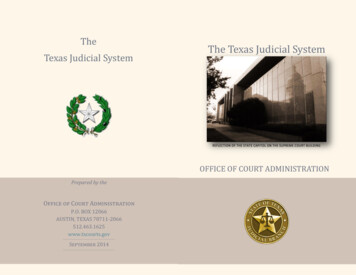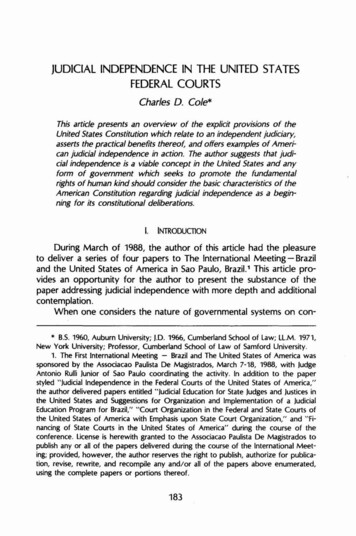
Transcription
JUDICIAL INDEPENDENCE IN THE UNITED STATESFEDERAL COURTSCharles D. Cole*This article presents an overview of the explicit provisions of theUnited States Constitution which relate to an independent judiciary,asserts the practical benefits thereof, and offers examples of American judicial independence in action. The author suggests that judicial independence is a viable concept in the United States and anyform of government which seeks to promote the fundamentalrights of human kind should consider the basic characteristics of theAmerican Constitution regarding judicial independence as a beginning for its constitutional deliberations.During March of 1988, the author of this article had the pleasureto deliver a series of four papers to The lnternational Meeting-Braziland the United States of America in Sao Paulo, Brazil.' This article provides an opportunity for the author to present the substance of thepaper addressing judicial independence with more depth and additionalcontemplation.When one considers the nature of governmental systems on con-* B.S. 1960, Auburn University; J.D. 1966, Cumberland School of Law; LL.M. 1971,New York University; Professor, Cumberland School of Law of Samford University.1. The First lnternational Meeting - Brazil and The United States of America wassponsored by the Associacao Paulista De Magistrados, March 7-18, 1988, with JudgeAntonio Rulli Junior of Sao Paulo coordinating the activity. In addition to the paperstyled "Judicial Independence in the Federal Courts of the United States of America,"the author delivered papers entitled "Judicial Education for State Judges and Justices inthe United States and Suggestions for Organization and Implementation of a JudicialEducation Program for Brazil," "Court Organization in the Federal and State Courts ofthe United States of America with Emphasis upon State Court Organization," and "Financing of State Courts in the United States of America" during the course of theconference. License is herewith granted to the Associacao Paulista De Magistrados topublish any or all of the papers delivered during the course of the lnternational Meeting; provided, however, the author reserves the right to publish, authorize for publication, revise, rewrite, and recompile any and/or all of the papers above enumerated,using the complete papers or portions thereof.
184The Journal of the Legal Profession[Vol. 13:183temporary earth, he should recognize the apparent need for an independent judicial branch of government to determine justiciable controversies in free societies. An independent judiciary serves as a checkupon the actions of the executive and legislative branches of government, assuring that one branch does not exercise the power of theother. Further, an independent judiciary, in a society with a constitutionwhich provides either explicitly or implicitly for separation of governmental powers, can assure that the legislative and executive powersare not merged, destroying the essence of representative government.As a matter of historical fact, one of the complaints asserted by theAmerican colonists in declaring independence from England was thelack of judicial independence of colonial judges who served at thepleasure of the King2Indicative of the recognition of the importance of an independentjudiciary in a country with a governmental structure similar to that ofthe United States, the Right Honorable Sir Ninian Stephen, GovernorGeneral of the Commonwealth of Australia, recently stated:Just laws certainly, and perhaps also more or less entrenched safeguards of human rights, whether as constitutional guarantees orotherwise, may be first and essential steps towards human freedomand recognition of the rights of each individual. But no less important is the second step, the integrity and freedom from influence, insum the independence, of the judiciary whose task it is to administer those laws. Only with a truly independent judiciary can freedom under the law have meaning and democracy's enacted lawsprevail.3The abiding concern of Americans for judges who are independent to render fundamentally fair judgments has been recognized bythe Sao Paulo State Judges Association. Judge Antonio Rulli, Junior, of2. See Rosenn, The Constitutional Guaranty Against Diminution of Judicial Compensation, 24 UCLA L. REV. 308, 311 (1976).3. Stephen, Address of His Excellency The Right Honorable Sir Ninian Stephen, 15MELB.U.L. REV. 746, 748 (1986). The Governor General further noted that "given justand equal laws, only an independent judiciary can ensure that in their impact on thecitizen such laws do operate with that fairness which their text demands." Id. at 747;see also, Gibbs, The Appointment of Judges, 61 AUSTL. L.J.7 (1987); Re, The Administration of Justice and the Courts, 18 SUFFOLK U.L. REV. 1 (1984). judge Re states that "[tlheindependence of the federal judiciary, meticulously established by the framers of theConstitution is indispensible to principled decision-making. judicial independence is theelement which makes possible the deciding of important, controversial issues on thebasis of merit and principle, rather than expediency." Id. at 4.
19881Judicial Independence185Sao Paulo delivered a paper to the Third Annual Conference of theInternational Political Science Association, Comparative Federalism StudyGroup, during March, 1987, at Philadelphia, Pennsylvania. In that paper,entitled "Conceptualizing State Constitutions in Brazil," Judge Rullinoted that the Sao Paulo State Judges Association had approved thethesis that:The citizen has the right to count on an independent Judiciary.1.1 An independent Judiciary is one with all its predicamentsconstitutionally ensured, therein included its economic, financial andadministrative autonomy, in order to effectively guarantee therights provided for in the Constitution, none of which shall fail tobe appreciated, regardless of law or regulatory rule, which in caseof omission may be made up for by the Judiciary i t e l f . Consistent with both Judge Rulli's paper and Governor GeneralStephen's address at the University of Melbourne, Justice Joseph R.Weisberger, a Justice of the Supreme Court of the State of Rhode Island, recently stated that "[Tlhe secret weapon which assured the success of [the Constitution of the United States of America] was the provision for an independent j diciary." Justice Weisberger illustrated his point by describing the resolutionof the American Watergate scandal of the 1970's as a tribute to anindependent judiciary. While the Justice recognized that Watergate iscited as a low point in the history of the American presidency, he veryaccurately described the event as a "magnificent testimonial to the durability of the American constitutional s y t e m . " The Watergate case t o which Justice Weisberger referred is Nixonv. United States.' In Nixon, the President of the United States was ordered by a federal district court judge to produce tapes of conversations to aid in the prosecution of a pending criminal case in which hewas named as an unindicted coconspirat r. The President resisted thesubpoena, asserting both the doctrine of separation of powers and theneed for confidentiality of high-level communications. The district court4. Address by Judge Antonio Rulli, Junior, Conceptualizing State Constitutions inBrazil, The Third Annual Conference, International Political Science Association, Comparative Federalism Study Group, Center for the Study of Federalism, Temple University, Philadelphia, Pennsylvania, U.S.A. (March 12-14, 1987).5. Weisberger, Judicial Independence, 72 MASS.L. REV. 28 (1987) (Special Constitutional Issue).6. Id. at 30.7 . 418 U.S. 683 (1974).8. Id. at 687.
186The Journal of the Legal Profession[Vol. 13:183rejected the President's claims of absolute executive privilege and theUnited States Supreme Court unanimously affirmed that holding. TheCourt, citing Marbury v. M a d i o n stated, that "it is the province andduty of this Court 'to say what the law is'1 with respect to the claim ofprivilege presented in this case."ll The Supreme Court then held thatthe President must respond to the order of the district court and noted:The impediment that an absolute, unqualified [executive] privilegewould place in the way of the primary constitutional duty of theJudicial Branch to do justice in criminal prosecutions would plainlyconflict with the function of the courts under art. Ill [of the Constitution of the United States].'*In his comments concerning Nixon, Justice Weisberger eloquentlyasserted that judgment was the only power possessed by the SupremeCourt. In contrast, he noted that the President was the Commander-inChief of the Armed Forces, head of the Department of Justice (throughhis appointee, the Attorney General), the executive head of the policeforces of the United States, and the appointing authority of all federalmarshals, the only direct means by which the federal courts implementtheir judgments and decrees.13 The resolution of the Watergate scandalserves as an excellent illustration of judicial independence in action. According to JusticeWeisberger, the President obeyed the decision of theCourt because:So ingrained had the concept of the supremacy of law become inour national psyche that the President of the United States, to hiscredit, gave no serious consideration to resisting this purely moralforce of judgment. Probably no such example of triumph of moralover physical power has been seen since the Holy Roman EmperorHenry IV came to Carnossa as a penitent and humbled himselfbefore Pope Gregory VII in 1076. No more persuasive evidencecould be given of the power of the judiciary than this example.14'9. 1 Cranch 137 (1803).10. Id. at 177.11. Nixon, 418 U.S. at 703.12. Id. at 707.13. Weisberger, supra note 5, at 31.14. Id. See also United States v. Lee, 106 U.S. 196, 220 (1882), for early evidenceof a judicially independent Supreme Court, wherein the Court stated:No man in this country is so high that he is above the law. No officerof the law may set that law at defiance with impunity. All the officers ofthe government, from the highest to the lowest, are creatures of the law,and are bound to obey it.
19881Judicial Independence187This article will discuss the nature of judicial independence underthe United States Constitution ("Constitution") by looking to the explicitprovisions applicable to the principle in the document. The specific provisions which will be discussed relate to judicial compensation (theCompensation Clause), tenure of judicial office (the Tenure Clause), andjudicial selection (the Appointments Clause). The Tenure Clause discussion will include comments concerning the doctrine of judicialimmunity.The primary emphasis throughout this article will be upon the applicable provisions of the United States Constitution because that Constitution provides a more effective basis for judicial independence thando the state constitutions within the United States ("United States").Also, the state constitutions differ dramatically in their provisions for thejudicial branch of government; therefore, generalizations regarding thespecific characteristics of state constitutions concerning judicial independence are not possible.This article will seek to sustain the premise that any form of government which seeks to avoid tyranny and to promote the fundamental rights of human kind, including state governments within the UnitedStates of America, shwld consider the basic characteristics of theAmerican Constitution regarding judicial independence as a point of beginning for constitutional deliberations.11.THE COMPENSATIONCLAUSEThe Compensation Clause provides that: "The judges, both of thesupreme and inferior courts, . . . shall, at stated times, receive for theirservices a compensation, which shall not be diminished during theircontinuance in office."15To the casual observer, the meaning of the Compensation Clausewould appear to be rather obvious; however, in an economy influenced by inflation, the clause merits additional analysis. In fact, a lawsuit was filed in 1977 by 140 United States circuit and district courtjudges against the Government of the United States in an attempt toobtain the compensation which they claimed was due them because of.Courts of justice are established, not only to decide upon the controverted rights of the citizens as against each other, but also upon rights incontroversy between them and the government; and the docket of thiscourt is crowded with controversies of the latter class.15. U.S. CONST.art. Ill, 5 1.
188The journal of the Legal Profession[Vol. 13:183the diminution of the real purchasing power of their compensationwhich had been caused by inflation.The class action, Atkins v. United States,le alleged that inflation hadeffectively diminished the judges' compensation in violation of theCompensation Clause, and that the Congress of the United States("Congress") had discriminated against judges in dealing with the problem of inflation as compared to their own members and other employees of the Government.l7 The facts of the case indicated that Congresshad increased the compensation of most Government employees36.5% between December, 1969 and December, 1975 and raised thebeginning salaries for Government lawyers 59.32% between March,1969 and October, 1975. During that same period, however, judgessalaries were not increased at a11.lePlaintiffs also alleged that the action of the Senate in disapprovingthe President's recommendations for increases in the compensation ofjudges and justices pursuant to the Salary Act of 1967, a method established by Congress which allowed the President to recommend increases every fourth year, was an unconstitutional exercise of executive power reserved for the President under article 11, section 1, of theConstitution.lBThe President had recommended 7.5% compensation increases in each of the fiscal years 1974, 1975, and 1976.*O The increases would have become effective under the terms of the SalaryAct at the beginning of the first pay period which began 30 days following the transmittal of the President's recommendation . The Senate action disapproving the President's recommendations was construed to be consistent with the applicable provisions of the SalaryThe Court of Claims first considered the need for the judges ofthe court to disqualify themselves due to either a financial interest inthe litigation, or circumstances in which a judge's impartiality might reasonably be questioned under the Code of judicial Conduct of theAmerican Bar Association, which had been adopted by the judicial16. 556 F.2d 1028 (Ct. CI. 1977), cert. denied, 434 U.S. 1009 (1978).17. Atkins, 556 F.2d at 1033.18. Id. at 1034.19. Id.20. Id.21. Id.22. Id. (Citing 2 U.S.C. § 359(1)(B) (1970)). But cf, 2 U.S.C. 5 359 (Supp. IV 1986)(Presidential recommendations effective unless disapproved by a joint resolution).
19881Judicial Independence189Conference of the United States.' It was ultimately determined thatthe Court of Claims was the only court with original jurisdiction andthat "disqualification [would] not be permitted to destroy the only tribunal with power in the premises."24 The Court recognized that alljudges could be disqualified on the basis of their impartiality's beingquestioned. The Court stated that: "[Tlhere is a maxim of law to theeffect that where all are disqualified, none are di qualified." Thus, theCourt found that the rule of necessity both authorized and required itto decide the cases. The rule of necessity, as defined by the Court,provides that "a judge is not disqualified to try a case because of hispersonal interest in the matter at issue if there is no other judge available to hear and decide the case."26In resolving the dispute, the Court of Claims looked to the historyof the Compensation Clause. The Court took note that the Framers ofthe Constitution in 1787 had first considered a compensation clausewhich would have prohibited the Congress from either increasing ordecreasing the compensation of judges. The Court further recognized,however, that after discussion, the Convention determined that thepurpose of the Compensation Clause was to prohibit Congress fromtampering with judges' salaries as a means of diminishing the authorityof the judicial branch of government, and, on balance, the power todiminish judicial salaries created the most danger to an independent judi iary. 'The Atkins opinion ultimately recognized that the Conventiondetermined that the power to increase judicial compensation was lessdangerous than the power to diminish compensation given the natureof changing circumstances which could be anti ipated. Thus, theCourt proceeded to the merits of the case with the realization that theFramers' purpose in drafting the Compensation Clause was not to ensure a real income purchasing power for judicial compensation but topreserve judicial independence. The Court then stated:Indirect, nondiscriminatory diminishments of judicial compensation,23. Id. at 1035-40 (quoting Brinkley v. Hassig, 83 F.2d 351, 357 (10th Cir. 1936)).24. Id. at 1037 (quoting Turner v. American Bar Ass'n, 407 F.Supp 451, 483 (W.D.Wis. 1975) (citing Evans v. Gore, 253 U.S. 245 (1920)).25. Id. at 1038.26. Id. at 1036.27. Id. at 1048. The Court noted that in 1776 the Continental Congress had complained, in the Declaration of Independence, that George Ill had made colonial judgesdependent upon him for both tenure and compensation as a means to extend his ruleover the colonies.28. Id. at 1048.
190The Journal of the Legal Profession[Vol. 13:183those which do not amount to an assault upon the independenceof the third branch or any of its members, fall outside the protection of the Compensation Clause, and the allegation of facts showing their existence does not state a claim for which relief can begranted in this court.2BFurther, the Court found that the intention of the Framers to protect the judicial branch of government with the Compensation Clausedid not include protection from the real value decline in compensationthrough inflation in the absence of proof of a discriminatory attack. TheCourt then considered whether plaintiffs had established a case showing "discriminatory diminishment of their salaries, in a manner thatamounts to an attack on the judiciary by the political branches, warranting protection under the Compensation Clause. . . ."30 In essence,the members of the judicial branch were recognized as having a rightto recover for either a direct or indirect diminution of their compensation if it could be shown that such occurred in a manner that attackedtheir independence as judges. Thus, the Court recognized that judicialindependence was the value to be protected by the CompensationClause instead of the purchasing power of the compensation.Obviously, drafters of constitutional provisions should take note ofthis construction. Judicial salaries should be linked to an appropriatelyrecognized standard of value or consumer pricing index to amelioratethe devastating effect of inflation on judicial compensation. The AtkinsCourt noted that such a suggestion was made by one of the most illustrious Framers, JamesMadison, over two hundred years ago at the Philadelphia Constitutional Convention. Madison proposed that using astandard such as wheat or other item of permanent value could guardagainst variations in the value of rnoney.3' The Court further noted,however, that Madison only raised the issue once and did not furtherelaborate upon it after another prominent delegate, Gouverneur Morris, called the idea unworkable because it did not account for the factthat the standard of living itself might change, not just the cost ofliving.3229. Id. at 1045. One would note, therefore, that the key to understanding Atkinsis that a tax or other diminution would not violate the Compensation Clause unlesssuch assaulted the purpose of the Clause, that is, preserving the independence ofjudges.30. Id. at 1051.31. Id. at 1046; see also 2 M. FARRAND, RECORDSOF THE FEDERAL CONVENTION OF 178745 (1966).32. Atkins, 556 F.2d at 1046.
19881Judicial Independence191The Atkins Court then discussed the circumstances under whichthe plaintiffs could recover pursuant to the Compensation Clause asfollows:[T]o make out a case, plaintiffs need not show a direct diminutionof judicial compensation, but the indirect diminution that they complain of must be of a character discriminatory against judges and,paraphrasing JusticeHolmes, must work in a manner to attack theirindependence as judges.33The Court recognized that if Congress refused to raise the nominaldollar salaries of judges during a period of hyperinflation, the threat tothe ability of judges to remain at their posts would be so great thatrelief under article Ill of the Constitution (presumably referring to boththe Compensation and Tenure Clauses) would be hard to refute.34TheCourt found, however, that hyperinflation was not present and movedto a discussion of the facts surrounding the congressional action andinaction which resulted in the seven year judicial salary freeze.The majority of the Court noted, after examining the political aftermath of the post-Watergate scandal, that the American people had lostconfidence in Government, and increases in compensation of executive-level federal employees was not politically viable during the yearsin question. Accordingly, the Court found that the circumstances surrounding the salary freeze did not suggest an assault on judicial independence. In failing to find congressional discrimination against the judicial branch of government, the Court concluded as follows:[W]e conclude that the recent action [presumably action of Congress in granting cost-of-living increases after this law suit was filed]demonstrates the belated good faith, nondiscriminatory efforts ofthe Congress and the Executive to secure a level of compensationto the judges that the public is willing to pay, inadequate as it maybe for numerous cogent reasons of less political weight.35Thus, in Atkins, the Court of Claims held that the plaintiffs hadfailed to state claims which entitled them to recover and the government's motion to dismiss the complaint was granted. The Supreme33. Id. at 1054.34. Id. The Court did not indicate what would constitute "hyperinflation" as abasis for relief. One could conjecture, however, that either double-digit inflation over arelatively short-term or high single-digit inflation over the long-term should suffice.35. Id. at 1057.36. Id. Two other issues in the case, i.e., justiciability of the alleged discriminatoryconduct of Congress and the constitutionality of the legislative veto allowing one
192The Journal of the Legal Profession[Vol. 13:183Court of the United States ("Supreme Court") denied review of theThe diminution of compensation issue was not, however, abandoned by the federal judiciary. Within a year after the Supreme Courtdenied review in Atkins, thirteen federal district judges sued the Government in Will v. United States.38The plaintiff-judges in Will claimedcost-of-living adjustments pursuant to the Cost-of-Living Adjustmentwhich provided that judges and other executive level employeeswould receive an annual cost-of-living adjustment as determined underthe Federal Pay Comparability Act of 1970.40This statutory mechanismprovides that the President shall issue executive orders establishing theamount of the cost-of-living increases after considering inflationary indicators. The President issued the appropriate executive orders grantingthe increases in the scenario leading to the Will case; however, theCongress passed an appropriations act on the first day of the 1976fiscal year which prohibited the use of appropriated funds for paymentof executive-level employees. In 1977, the Congress enacted legislationseveral months prior to the new fiscal year which provided that adjustments to the executive-level salaries would not take effect.The district court articulated the question as "whether the Compensation Clause of Article Ill, j1 of the United States Constitution hasbeen violated by Congress' refusal to pay plaintiffs cost-of-living adjustment for the salary periods commencing October 1, 1976 and October1, 1977.'141The district court found that Congress' refusal to pay thecost-of-living adjustments in question constituted a diminution in thejudges' compensation and, therefore, violated the CompensationClause.42The plaintiffs in Will filed a second law suit based upon the sametheory of relief for the years 1978 and 1979. In those years, by legislative enactment, Congress stopped payment of the cost-of-living adjustHouse of Congress to defeat recommendations of the President for judicial salary increases under the Salary Act, were not discussed in this article because such were notconsidered particularly relevant to the topic. See Immigration & Naturalization Servicev. Chadha, 462 U.S. 919 (1983) for a rationale of the Court regarding the constitutionalproblem applicable to legislative veto provisions.37. Atkins v. United States, 434 U.S. 1009 (1978) (certiorari denied).38. 478 F. Supp 621 (N.D. 111. 1979).39. Id. at 624 (citing 28 U.S.C. 5 461 (1975) (Cost-of-Living Adjustment Act)).40. Id.; see also Pub. L. No. 91656, 84 Stat. 1946, 1946-55 (codified as amendedat scattered sections of 5 U.S.C.).41. Will, 478 F. Supp. at 623.42. Id.
19881Judicial Independence193ments for judges and executive-level Government employees. In oneof the years in question the President signed the bill into law prior tothe beginning of the fiscal year, and in the other year he signed the billinto law after the fiscal year had begun. After judgment for the plaintiffs in both cases, the Supreme Court consolidated the cases for appellate review. The Court articulated the issues as: "[Wlhether under theCompensation Clause, Article Ill, 5 1, Congress may repeal or modify astatutorily defined formula for annual cost-of-living increases in thecompensation of federal judges, and, if so, whether it must act beforethe particular increases take effect."43The Supreme Court noted first that the Compensation Clause wasdesigned to benefit the public interest in a competent and independentjudiciary, not the judges as individual . Further, in answering the question that the Supreme Court posed for itself, it found that the cost-ofliving increases which had vested prior to the Congressional action became compensation that could not be diminished. Even so, the increases which were cancelled by legislation prior to vesting at the beginning of the respective fiscal years were not held to be compensationdue and payable, and the Congress was found to have authority torepeal such legislation under the Compensation Clause.The discussion of Atkins and Will is meaningful in that it providesthe current interpretation of the Compensation Clause of the UnitedStates Constitution. More importantly, however, the fact that the caseswere presented by judges of the federal judicial system and adjudicated by that same system indicates that the United States Constitutiondoes provide for judicial independence- both in theory and fact.111.THE TENURE CLAUSEAND THE DOCTRINE OF jUDlClAL IMUNITYThe Tenure Clause of the Constitution provides that "[tlhe judges,both of the supreme and inferior courts, shall hold their offices duringgood behavior. . . ."45 Much, if not all, of the discussion concerning theCompensation Clause should be recognized as applicable to the TenureClause. As pointed out by the Court of Claims in Atkins:Long ago Justice Story noted the integral relationship of the Compensation Clause and the Tenure Clause, the latter securing t ojudges, . . . their continuance in office "during good Behavior."Without the one provision, he said, guaranteeing an undiminished43. United States v. Will, 449 U.S. 200, 202 (1980).44. Id. at 217.45. U.S. CONST. art. 111, 5 1.
194The Journal of the Legal Profession[Vol. 13:183compensation, "the other, as to the tenure of office, would havebeen utterly nugatory, and indeed a mere mockery. . . ." The twoclauses are inextricably tied to one another in pursuit of securingjudicial independence, and to allow the indirect diminution ofjudges' salaries to accomplish what the political branches are forbidden to do directly under the Tenure Clause would be to sanction a deplorable ruse at the expense of constitutional prin iple.' The Tenure Clause was separated from the Compensation Clausefor the purpose of this article for t w o reasons: (1) the CompensationClause discussion required that the cases discussed supra should behandled separately; and, (2) the independence created by allowing federal judges to continue in office during good behavior has historicallyconstituted virtual life-tenure. Virtual life-tenure in judicial office is certainly conducive to the facilitation of independent judicial decisions.Even so, when virtual life-tenure is recognized, the body politic becomes concerned about accountability. These comments concerningthe Tenure Clause, with a brief comment concerning the doctrine ofjudicial immunity, emphasize the need for the discussion of judicial accountability infra."The prudent observer should recognize that the judicial independence gained by judicial immunity from liability for all judicial acts increases the accountability concern perceived b y the general public. Inthe United States, the Supreme Court recognized the doctrine of judicial immunity in 1871, asserting that:[I]t is a general principle of the highest importance to the properadministration of justice that a judicial officer, in exercising the authority vested in him, shall be free to act upon his own convictions,without apprehension of personal consequences to himself. Liabilityto answer to every one who might feel'himself aggrieved by theaction of the judge, would be inconsi
American Constitution regarding judicial independence as a begin- . * B.S. 1960, Auburn University; J.D. 1966, Cumberland School of Law; LL.M. 1971, New York University; Professor, Cumberland School of Law of Samford University. . American colonists in declaring independence from England was the



